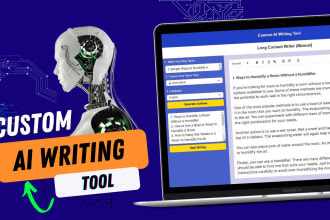The Evolution and Impact of AI Development. Artificial Intelligence (AI) has rapidly transformed from a futuristic concept to a tangible and pervasive reality, revolutionizing industries and reshaping the way we interact with technology. The journey of AI development has been marked by significant breakthroughs, challenges, and ethical considerations that have shaped its trajectory. In this article, we delve into the evolution of AI development, its impact on various sectors, and the considerations for its responsible integration.
The Evolution of AI Development
The concept of AI dates back to the mid-20th century, when researchers like Alan Turing laid the theoretical groundwork for intelligent machines. However, it wasn't until the last few decades that AI development gained momentum, thanks to advancements in computing power, data availability, and algorithmic innovation.
The 1950s and 60s marked the birth of AI, with early attempts to develop programs that could simulate human reasoning. The term "artificial intelligence" was coined during this period, and researchers were optimistic about creating machines that could think and learn like humans.
The 1980s saw the emergence of expert systems, which were designed to mimic the decision-making capabilities of human experts in specific domains. Despite their limitations, these systems laid the foundation for more sophisticated AI technologies.
The late 1990s and early 2000s witnessed significant breakthroughs in machine learning, particularly with the rise of neural networks and deep learning algorithms. These advancements enabled computers to process and analyze vast amounts of data, leading to breakthroughs in image and speech recognition.
Impact on Industries
AI's development has had a profound impact on various industries, fundamentally altering the way business is conducted and transforming traditional practices.
Healthcare: AI has played a pivotal role in diagnosing diseases, predicting patient outcomes, and drug discovery. Machine learning algorithms can analyze medical images, such as X-rays and MRIs, with remarkable accuracy, assisting healthcare professionals in making informed decisions.
Finance: In the financial sector, AI algorithms are used for fraud detection, algorithmic trading, credit scoring, and risk assessment. These technologies process massive amounts of financial data in real time, leading to more efficient and accurate predictions.
Manufacturing: AI-driven robotics and automation have revolutionized manufacturing processes, improving efficiency, reducing errors, and enabling mass customization. Collaborative robots, or cobots, work alongside human workers to enhance productivity and safety.
Retail: AI has transformed the retail landscape with personalized recommendations, inventory management, and supply chain optimization. Chatbots and virtual assistants enhance customer service and streamline interactions.
Transportation: Self-driving cars, powered by AI, are poised to reshape transportation by reducing accidents, improving traffic flow, and increasing accessibility for individuals with limited mobility.
Entertainment: Streaming services use AI algorithms to recommend content based on user preferences, creating personalized entertainment experiences. AI-generated content, such as music and art, is also gaining traction.
Challenges and Ethical Considerations
While AI development offers numerous benefits, it also presents challenges and ethical considerations that must be addressed.
Bias and Fairness: AI systems can inherit biases present in the data they are trained on, leading to discriminatory outcomes. Ensuring fairness and minimizing bias is essential to avoid perpetuating social inequalities.
Job Disruption: Automation driven by AI has the potential to displace certain job roles, raising concerns about unemployment and the need for reskilling and upskilling the workforce.
Privacy: The use of AI to analyze personal data for insights raises privacy concerns. Striking a balance between data-driven innovation and individual privacy rights is a complex challenge.
Accountability: As AI systems become more autonomous, questions arise about accountability in cases where AI makes decisions that have real-world consequences.
Ethical Decision-making: Developing AI systems that can make ethical decisions aligning with human values is a significant challenge. Ensuring that AI respects moral and ethical standards is crucial.
Responsible AI Development
To ensure the responsible development and deployment of AI, stakeholders must consider several principles:
Transparency: AI systems should be transparent, with understandable decision-making processes that can be audited and explained.
Fairness: Developers must actively mitigate bias and ensure that AI applications do not discriminate against any individual or group.
Privacy: Data privacy must be safeguarded, and AI systems should adhere to strict data protection standards.
Accountability: Clear lines of responsibility and accountability must be established for AI systems and their outcomes.
Ethics: Developers should prioritize ethical considerations, promoting the well-being of individuals and society.
Conclusion
AI development has come a long way from its theoretical origins to its current state of practical implementation across various industries. The impact of AI is undeniable, with transformative changes in healthcare, finance, manufacturing, retail, transportation, and entertainment. However, as AI continues to evolve, it is imperative to address challenges related to bias, job disruption, privacy, accountability, and ethics. By adhering to principles of responsible AI development, we can harness the power of AI to enhance our lives while ensuring a more equitable and sustainable future.



0 Comments